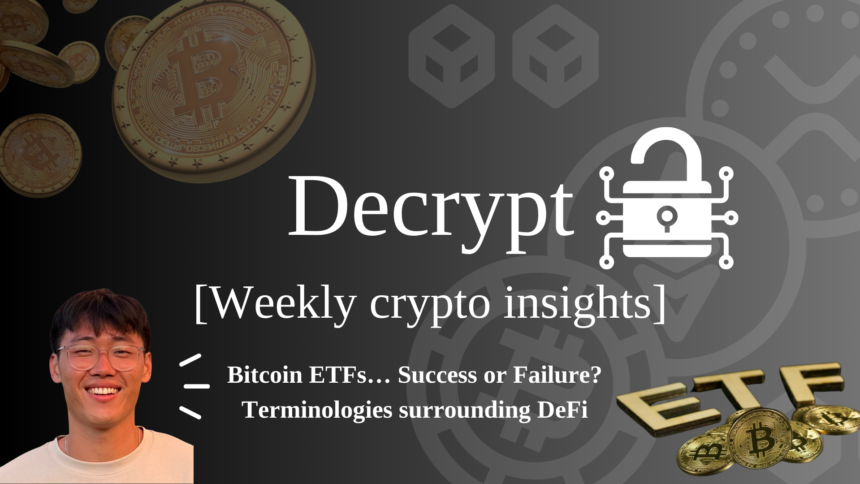Zayden is currently at start-up incubator, WhatNot Studios in Bangkok, Thailand. Originally from Singapore, his inquisitive nature brought him overseas to gain experience and learn new things.
It is that same nature that got him into DeFi and Web3, often spending hours a day reading up on it. Self-proclaimed Web3 enthusiast, and investor in cryptocurrency.
Guest Author: Zayden Qu
So what has been happening around Crypto this week?
By all accounts, the launch of the Bitcoin spot Exchange Traded Fund (ETF) on 11 January 2024 was one for the history books. It broke the record of being the largest launch of an ETF in history, trading volume at $4.6 billion on the first day. As of now, it has already overtaken silver as the second largest ETF commodity.

However, it is already coming to the end of January, and against many people’s expectations, Bitcoin’s price on 26 Jan was around 6% lower than from a month ago. Why is that so? Well, I did the deep diving and reading and have 2 theories that could explain the poor performance despite the historic ETF launch.

- Grayscale Bitcoin Trust ($GBTC) has sent more than 120,000 Bitcoins (worth around $5 billion) to be sold since the beginning of Bitcoin ETF trading. This likely contributed significantly to the selling pressure that caused the slump in Bitcoin price. Why have they been selling so much?
- Many owners of $GBTC prior to Bitcoin spot ETF approval, decided to cash out on their shares now
- $GBTC has an administrative fee of 1.5%, that is 6 times higher than their competitors, averaging at 0.25%. Many owners may be selling their $GBTC to switch over to other ETFs.
- The bankrupted FTX liquidated their $GBTC shares for a total of roughly $1 billion.
The silver lining? The selling slowing significantly, FTX has finished selling their shares and outflows of $GBTC have been “eaten up” by the 9 other ETFs, keeping the net inflow positive and at a healthy level

(ETF flows from Day 12 of trading – @JSeyff on twitter – https://twitter.com/jseyff?lang=en)
- “History doesn’t repeat itself, but it often rhymes” – Mark Twain. Historically, the price of Bitcoin follows a halving cycle, and there is a pullback for Bitcoin approximately 90 days before Bitcoin halving, this time it is no different. If the past is anything to go by, a pre Bitcoin halving dump is extremely normal, and so far, there is nothing that suggests that this price drop is anything out of the ordinary.

On a positive note, Google Ads! Google has officially updated their advertising policies to allow Bitcoin ETF to be promoted as advertisements. And the investment firms wasted no time:

Thats all the recent news this week surrounding Crypto and Web3!
The all-you-need-to-know Glossary for Terminologies surrounding DeFi & Crypto
A
Altcoin
- Any cryptocurrency or token that is not Bitcoin e.g., Etherum, Solana, Cardano.
D
dApp – Decentralized Application
- Any application that is built on a blockchain without needing a central authority to work. For example, Facebook is a centralized social media app, that manages all the messaging and content that is posted in it.
DeFi – Decentralized Finance
- DeFi is technology built on blockchain that negates the need of an intermediary (usually banks). Conventionally, transferring money to your friend is done through a central authority (“your bank” to “friend’s bank”).
DAO – Decentralized Autonomous organization
- It is basically a management structure that does not the need a central management/authority. Instead, the organization operates via details of a smart contract that is voted upon by members in the blockchain.
DEX – Decentralized exchange
- An exchange that relies on smart contracts to execute buy/sell or swap orders instead of using a central organization such as Bank to execute these orders.
E
Ethereum & Ether (ETH)
- Second largest cryptocurrency, 16.7% of total crypto market cap. Ether (ETH) is the native token name for Ethereum.
F
Fiat currency
- Traditional currency – e.g., US dollars, Euros.
G
Gas fees
- They are essentially a cost/fee for every transaction that happens on the Ethereum network that are paid in Ether.
H
Halving (Bitcoin Halving)
- An event that happens every 4 years, whereby the rewards for Bitcoin mining is halved. Historically coincides with an increase in demand for Bitcoin, driving up its price.
HODL
- Started as a typo of “hold” and then retrofitted to mean “hold for dear life”, but essentially refers to holding a token for the long-term despite the price action of the token.
I
ICO – Initial coin offering.
- It is essentially a crypto equivalent of Initial Public Offering (IPO). It places the project onto the cryptocurrency market and allows for investors to invest.
M
Market Capitalization
- Commonly called market cap, it represents the total market value of a cryptocurrency.
Mining
- Essentially the process of creation of new cryptocurrency tokens like Bitcoin using the Proof of Work (PoW) consensus mechanism – that is further elaborated on later. Bitcoin halving will half the rewards given upon successful mining.
N
Node
- A computer or device that holds onto a copy of a blockchain. It operates together with a network of other nodes to support the blockchain by sharing information and validating transactions.
NFT – Non-Fungible Token
- A digital collectible that uses blockchain technology.
P
P2P – Peer-to-Peer
- A transaction that is between 2 people without the need of a central authority.
PoS – Proof of Stake
- A more modern and energy efficient blockchain consensus mechanism compared to PoW. Validators are employed to create new blocks and confirm transactions based on the amount of cryptocurrency they are willing to lock up as collateral, or stake.
Proof of Work – PoW
- A less energy efficient blockchain consensus mechanism that requires miners to use a lot of computational power to solve a hash in order to add a block to the blockchain. This keeps the blockchain secure as the solution will be broadcasted and verified by all other miners. The reward for solving the hash will be cryptocurrency.
S
Smart contract
- A programme that runs autonomously on a blockchain when specific requirements are met, without the need of an intermediary. The contract cannot be altered or reversed.
Stable coin
- A cryptocurrency that is linked to a conventional currency to maintain an unchanging value. E.g., USDC or Tether.
Staking
- Used in PoS consensus mechanism. Staking is locking up your crypto in a node/with a validator to help with validating of new blocks, ensuring the security of the blockchain. Validators and stakers are then rewarded with the native cryptocurrency. Akin to savings account in Cryptocurrency.
T
Tokenomics
- It is the “study” of supply, demand, distribution, and valuation of cryptocurrencies. How the token operates inside the project ecosystem and how they intend to keep it deflationary. Also known as “Token economics”
V
Validator
- Someone who validates transactions on a PoS blockchain to earn the native crypto token as a reward. A validator must have a significant “staked” cryptocurrency as collateral.
W
White paper
- A document that details all the technical information and how-it-works of a new crypto project.
- The website









